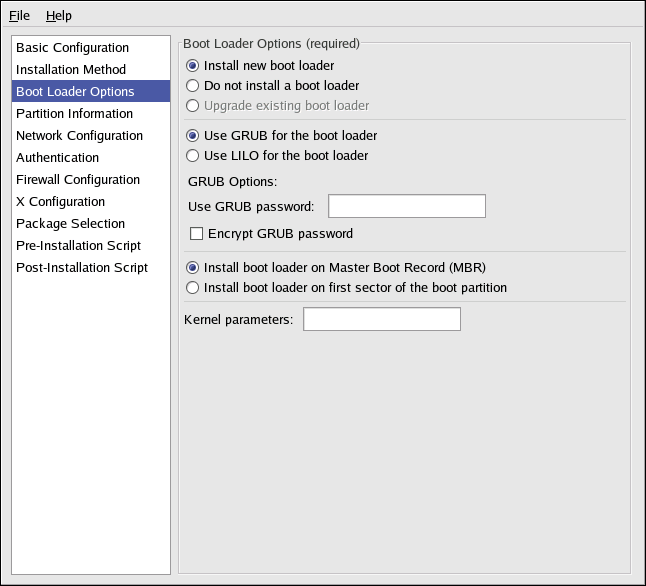Boot Loader Options
You have the option of installing GRUB or LILO as the boot loader. If you do not want to install a boot loader, select Do not install a boot loader. If you choose not to install a boot loader, make sure you create a boot disk or have another way to boot (such as a third-party boot loader) your system.
If you choose to install a boot loader, you must also choose which boot loader to install (GRUB or LILO) and where to to install the boot loader (the Master Boot Record or the first sector of the /boot partition). Install the boot loader on the MBR if you plan to use it as your boot loader. If you are using a different boot loader, install LILO or GRUB on the first sector of the /boot partition and configure the other boot loader to boot Red Hat Linux.
If you need to pass any special parameters to the kernel to be used when the system boots, enter them in the Kernel parameters text field. For example, if you have an IDE CD-ROM Writer, you can tell the kernel to use the SCSI emulation driver that must be loaded before using cdrecord by typing hdd=ide-scsi as a kernel parameter (where hdd is the CD-ROM device).
If you choose LILO as the boot loader, choose whether you want to use linear mode and whether you want to force the use of lba32 mode.
If you choose GRUB as the boot loader, you can password protect it by configuring a GRUB password. Enter a password in the Use GRUB password text entry area. If you want to save the password as an encrypted password in the file, select Encrypt GRUB password. When the file is saved, the plaintext password that you typed will be encrypted and written to the kickstart file. Do not type an already encrypted password and select to encrypt it.
If you selected to Upgrade an existing installation on the Installation Method page, you can select Upgrade existing boot loader to upgrade the existing boot loader configuration, while preserving the old entries.
